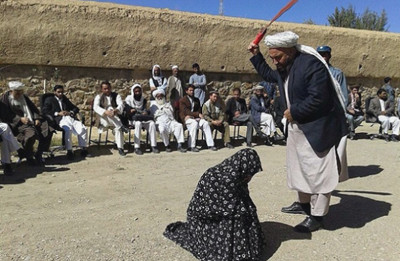By Ezatullah Niazi
Women in the eastern province of Nangarhar are increasingly falling victim to summary justice procedures, according to speakers at an IWPR-organised debate in provincial capital Jalalabad.
The event heard that tribal courts operating in the province, particularly in more remote areas, often meted out brutal punishments to vulnerable women, including stoning, mutilation, beating and forced marriage.

Woman being lashed in public in Ghor province for adultery. A local court passed the sentence in accordance with the Sharia law and the police took measures to safeguard the event.
Although substantial progress had been made in the field of women’s rights since the fall of the Taleban in 2001, speakers warned that these achievements were now at risk.
Hashima Sharif, head of the women’s rights section of the regional office of the Afghanistan Independent Human Rights Commission (AIHRC) said that corruption in the provincial justice system meant that abuses routinely went unpunished.
She highlighted one case in which she said a woman from a village in Nangarhar had been sold into marriage with seven different men, giving birth to a child with each marriage. Eventually the woman, along with her seven children, was sent back to her first husband.
In another incident in the Bati Kot district of Nangarhar, Sharif said, “A woman was sentenced to hard labour, due to the ‘crime’ of giving birth to five girls.”
Abdul Mohammad, head of the human rights section of Nangarhar police, acknowledged that such mistreatment of women, including forced marriage, was a problem in the province.
Mohammad recalled an incident in which local police had to intervene after a man chained his wife up for six months to punish her.
He added, “I can confirm that in the past, in some areas in Nangarhar, women were sold from one man to another up to four or five times. However, women are no longer sold in this way.”
Mohammad also accepted that complaints of gender violence had risen, but argued that this was a reflection that women now had better access to justice and felt more confident about coming forward to the police.
Nangarhar appeal court judge Abdul Aziz Niazai said that it was a fundemantal lack of awareness of women’s rights that led to the use of summary justice.
“Every man that is ignorant of women’s rights commits violence against women,” he said.
This report was produced under IWPR’s Promoting Human Rights and Good Governance in Afghanistan initiative, funded by the European Union Delegation to Afghanistan.
Originally published on Feb. 13, 2016



